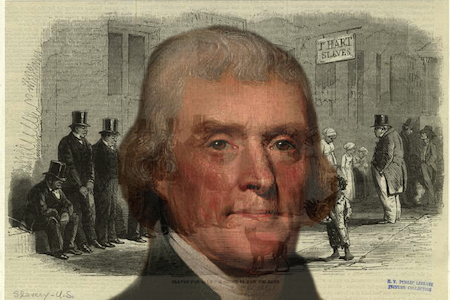Thomas Jefferson: Monster?

Credit: Wiki Commons/HNN staff.
Thomas Jefferson, slave owner, is once again a subject of heated debate. Recent fights among historians confirm what we already knew, not just about Jefferson, but about us: that we need him, now more than ever, as a touchstone to explain the troubled history of the United States to ourselves, its living inheritors. It seems worth pausing to reflect on how and why that is.
The effort to understand is one the great strengths of Annette Gordon-Reed’s The Hemmingses of Monticello, which tells a story about how people manage to lead human lives in inhuman conditions. The criticism that arises in Henry Wiencek’s The Master of the Mountain is that Gordon-Reed has taken her human story to such an extreme that we are left unable to even see how inhuman the whole thing really was. He has come under heavy criticism from other Jefferson scholars and from Gordon-Reed in particular.
Paul Finkelman, writing in the New York Times, takes Jon Meacham, author of Thomas Jefferson: The Art of Power, along with other Jefferson scholars to task for the limited discussion of slavery and in Weineck’s case for the residual, ever so faint need to rescue a bit of the revolutionary, nominally abolitionist Jefferson from the dustbin. Jefferson, Finkelman informs us, was simply a “monster,” and a “creep,” one of the “creepiest” figures in our history, and any effort to understand beyond that is a fool’s errand. And yet here we are.
Jefferson gave focused, conscious intellectual and institutional support to the protection and extension of the slave regime, and Finkelman is right on target in highlighting this wider history in relation to what is pretty much a biographical discussion. But that makes Finkelman’s heavily strained moral outrage even more confusing. There are two problems with his performance.
First, he remains shocked and indignant that slave owners were actually slave owners, and so he unwittingly participates in a kind of condensed American exceptionalism. The intended effect is alienation, distancing, a quarantine of sorts, but that is to go in the wrong direction. We Americans are going to have to own up to the fact that the origins of our political life are inseparable from a history of power, force, and brutality, and it is amazing that a distinguished historian of law and slavery manages so little to help us do that. He would rather make sure that we know where he stands, firmly in opposition to the practices of antebellum chattel slavery. That he seems to think his colleagues are on the other side is... well, creepy.
Second, contests among historians to brandish their moral indignation at the past marginalize important continuities in history. If Jefferson’s place in the history of slavery is a particularly important and notable one, and it is, it is not because of his prominence in other areas but because he developed an intellectual account of racial superiority and property rights that strengthened the slave system.
Even so, Jefferson was able to buy and sell human beings while writing about liberty and even criticizing slavery because he was able to see African Americans as not counting in liberty’s demands. This should matter to us not because it looks bad today but because our theory and practice of that same liberty continues to disavow the challenge of acknowledging others, be they undocumented immigrants, the poor, the marginalized in our own country, to say nothing of the human cost of war.
I hold out hope that the perpetual popping up of Jefferson in our memory can be put to good use for the living. Our questions in a debate about Jefferson have been “did he or didn’t he,” (he did), or “how bad was it,” (it was awful), but perhaps we can go on to ask under what conditions does it become possible not to see people, and what are the conditions of possibility for seeing anew?
To approach the issue this way would be to understand the history we write as a history in and indeed of the present. It would be to acknowledge ourselves in history, and maybe the way forward is not walking away or wiping off but actually turning around and looking and owning up to what we find. It might just be that in renewing the awareness of our being products of history that we can untangle some of its knots, loosen its hold, and learn to do some thinking for ourselves.
